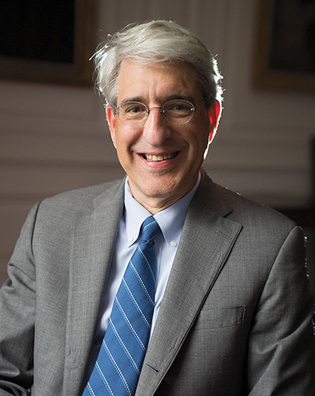 loading
loading
Q&A: Peter SaloveySports and the studentWhy Yale invests in varsity athletics. The Yale Alumni Magazine regularly holds a conversation with Yale president Peter Salovey ’86PhD to provide a forum in which alumni can learn his views. (Interviews are conducted both in person and by e-mail and condensed for print.)  Mark OstowView full imageY: Universities based in the US generally invest more time and money in varsity-level sports than research universities globally. What do you see as the role of varsity athletics at Yale? S: First, athletics is part of our educational mission for the entire university. Yes, we have over 30 varsity teams in Yale College. But we also have club sports, intramural sports, and recreational athletics, which are for everyone. Yale community members can walk into the gym and swim in the pool, play squash, or take a class. The graduate and professional students have many intramural teams, as do the residential colleges. Yale has a broad commitment to athletics at multiple levels, including at the recreational level, for all of us. And varsity athletics is part of our educational mission in Yale College. Yale strongly supports the Ivy League model: we think of those who play on our varsity teams as student-athletes, and “student” comes first. Our varsity athletes compete in sports at a level much higher than most others can achieve. But they are here as students, to get a great education. That is the most important aspect of their time at Yale. The athletics program, including the varsity teams, is an important part of the Yale College educational experience because students learn by playing their sport. They learn self-discipline; how to work as part of a team; how to subordinate an individual goal to a group accomplishment; and how to be resilient in the face of failure. Athletes fail in practice and in matches every single day. Developing resilience to disappointment is incredibly important in life. Through athletics, students also learn how to manage their emotions. In my own research on emotional intelligence, we talk about team sports, in particular, as a way of learning, for instance, how to delay gratification and how to be gracious in both victory and defeat. These are critical life skills. It is not our intent to serve as a “minor league” for the NFL or to generate revenue from media coverage. Our primary goal is to allow students to participate at a high level in activities they love that will help them develop into adults. Y: Can’t other activities teach life lessons? S: Absolutely. Students can learn similar lessons by participating in other efforts that require working as part of a team. Think of a theater production, a musical ensemble, or a debate team. Many activities require a commitment of time and energy to produce something of great quality. Self-discipline, practice, resilience, learning how to perform under intense scrutiny in front of an audience: there are multiple ways to have these experiences at Yale. We have to remember, however, that the athletics program also does a great deal for Yale as a community. Our student-athletes wear blue and white uniforms with the name of Yale emblazoned on them, and their performance as athletes—whether they win or lose—can be a great source of pride for the institution. When our student-athletes perform in a way we can be proud of, we celebrate our common identity as members of the Yale community. Y: It’s true that more alumni come back for football games than symphony concerts. S: I would like our alumni to come back for everything: athletic contests, yes, but also concerts, theater productions, debates, lectures, museums, and reunions! Those are just the start. Y: The football team was amazing this year. They’ve had struggles in the past. How did they get so good? S: The success of our team starts with leadership. Our athletic director, Tom Beckett, is retiring at the end of the season—his 24th year at Yale. He has put enormous effort into the personal development of student-athletes, and he models an ethical compass, responsibility, and dignity every day. And we have a terrific coach in Tony Reno. Tony was the first coach to require that his players live in their residential colleges through at least their junior year. He wants to break down barriers between student-athletes and non-athletes. This year we also had a wonderful captain, Spencer Rymiszewski, who helped the team mature. We have seen the proof of Yale’s approach to athletics in the many student-athletes who have gone on to great leadership positions. Think of Abigail Disney ’82, who played volleyball and became a very distinguished filmmaker. Field hockey legend Carol Roberts ’81 is now a leader in the packaging industry. Geoff Tabin ’78, who was captain of men’s tennis, is the cofounder of the Himalayan Cataract Project and a professor of ophthalmology and global medicine at Stanford. Joe Tsai ’86, ’90JD, a walk-on lacrosse player, was one of the founders of Alibaba. What is important here is that educating leaders for all sectors of society, throughout the world, is part of Yale’s mission and fundamental purpose, reinforced by Yale’s athletics program.
The comment period has expired.
|
|